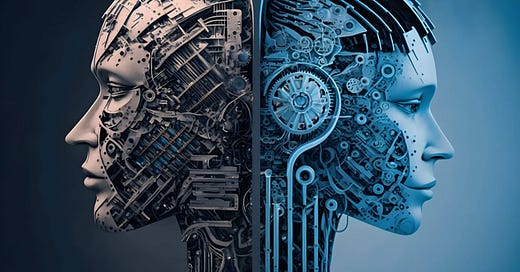Artificial Intelligence (AI) is changing the world - and promises to do so in increasingly revolutionary fashion in the coming years. Whilst I am no expert in the field, I have been increasingly integrating AI in day-to-day tasks and my work. For this Substack, AI presents a fantastic research tool, allowing me to find the information I need much quicker than a standard search engine whilst also presenting me with feedback, alternative interpretations, and counterarguments I may not have thought of myself.
The actual writing of this Substack (and anything else I produce) will always be my own. I love writing and will never outsource that. AI simply helps me with the tasks necessary to produce the best quality writing I can in a short amount of time.
AI is, it has been argued by many, the modern-day Gutenberg Press. The Gutenberg printing press, invented by Johannes Gutenberg around 1440, revolutionised the production and dissemination of knowledge and ideas around the world.
Previously, books were handwritten in a slow and painstaking process, making them rare and expensive. Ordinary people largely had to rely on the interpretations of the elites who could afford books, especially for religious texts such as the Holy Bible. Now, though, books could be mass-produced in a cost-effective manner. This democratisation of knowledge led to profound changes in society, not least the Protestant Reformation.
In a similar manner, AI can be used to perform tasks that previously required specialist skills, such as software coding and data analytics. Much as the Internet allows access to humanity's collected information and recorded data, AI allows us to go further in interpreting and utilising that information in ways that we could not do ourselves. Knowledge and information no longer flows top-down from the elites.
The relative ease of publishing texts enabled by the Gutenberg Press accelerated scientific discovery and inquiry. Artificial Intelligence promises to expand this acceleration exponentially. Whilst the Gutenberg Press allowed ideas to spread – furthering the development of science and other fields of research - AI will allow us to analyse and assess data in ways that would previously have been difficult and expensive. The implications for fields such as medical research are astounding.
The implications of the Gutenberg Press were not all peaceful. Challenging dominant authority, particularly the Church, led to numerous conflicts including the religious wars that wracked Europe through the 15th to 18th centuries. AI promises to challenge and destabilise entrenched power systems in a similar manner, and it would be naive of us to expect this to come absent conflict. AI will also revolutionise how those conflicts are waged, with the rapid developments in drone warfare happening in real time in the Russo-Ukraine war only the beginning.
Artificial Intelligence promises to change our world in profound ways. Many of these are hopeful, others less so. Given the duality of human nature, we should expect a mix of good and bad to emerge. It is likely not going to lead to the end of the world, nor will it take us to some new Utopia.



